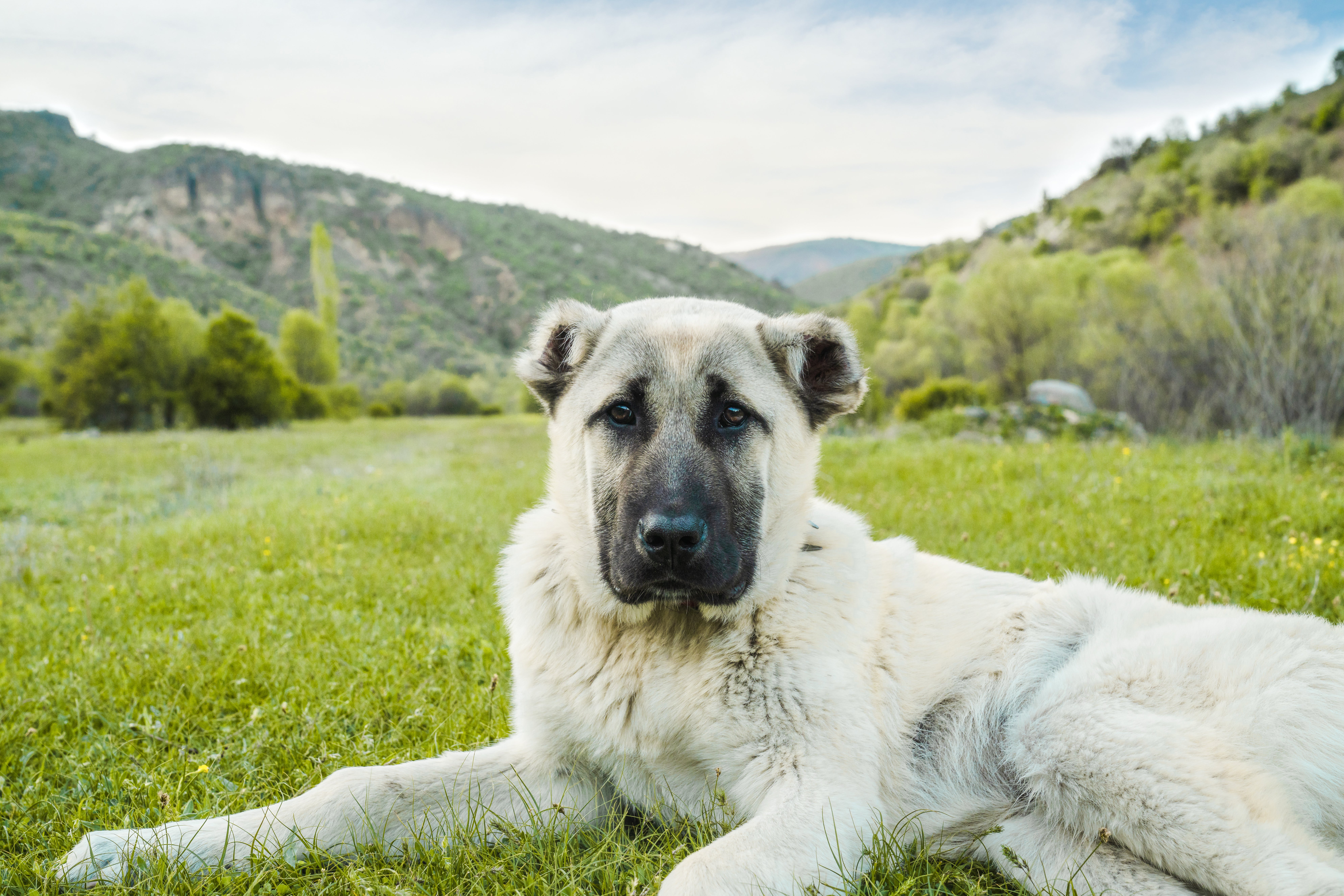Anatolian Shepherd
The Anatolian Shepherd Dog is a guardian breed through and through. This large, powerful dog possesses both impressive agility and remarkable stamina. Their well-built bodies boast strong bones and a broad head. Anatolians move with a powerful yet smooth and fluid gait. Their double coat, with a thick undercoat and a topcoat ranging from short to rough (with some extra fluff around the neck and mane), provides insulation and weather protection. An intelligent expression and a bold yet calm demeanor complete the picture of a confident and capable protector.
Breed characteristics carousel
Learn More
Need to Know
- Suitable for experienced owners
- Extra training required
- Generally healthy breed
- Enjoys active daily walks
- Large dog
- Some drool
- Requires grooming once a week
- Quiet dog
- Barks, alerts, and may be physically protective/suspicious of visitors
- Gets along with other pets with training
- Might not like unknown dogs
- May need additional supervision to live with children
- Needs a large, fenced-in yard
- Best suited to rural areas
- Can be left alone occasionally with training
- AKC Registered Breed

Personality
The Anatolian Shepherd is a paradox of loyalty and independence. Deeply devoted to their family, they take their guardian role seriously. While calm and easygoing at home, they are serious, naturally wary of strangers, and highly territorial. This protectiveness can manifest as barking when unfamiliar sights or sounds trigger their alert nature. Their focus on guarding duties might not match a child's desire for an overly playful companion, making them better suited for an adult-only home with a more experienced owner.
With roots likely tracing back 4,000 years, the Anatolian Shepherd has a rich history as an ancient guardian breed. Descendants of protectors like the Tibetan Mastiff, they became invaluable companions to Turkish shepherds, fiercely keeping flocks safe from predators. Their widespread presence led to variations in size and coat, but unwavering loyalty, independence, and hardiness remained constant.
Interestingly, the name "Shepherd" might be a slight misnomer. While Anatolians excel at guarding, they aren't traditionally used for herding. Their true Turkish name, "Coban Kopegi," translates to "Shepherd's Dog," reflecting their role as protectors.
They arrived in the U.S. in the 1950s and excelled as livestock guardians, but AKC recognition came later in 1996. Prized for their utilitarian value, Anatolians gained popularity among pet owners seeking loyal watchdogs.
The ideal owner for an Anatolian Shepherd is someone who can provide a stable and spacious rural environment. This breed thrives with experienced owners who are strong leaders and value the breed’s loyalty and protective instincts. A large, securely fenced property is a must, and frequent visitors or unfamiliar dogs might not be a good fit due to the Anatolian's wariness of strangers. Owners who spend significant time at home are ideal, as these dogs form strong bonds with their families and prefer familiar faces.
Anatolian Shepherds are energetic dogs who require daily exercise. But exercise isn't just about physical activity; it's about mental stimulation too. Interactive training sessions and puzzle games that allow them to work with their owner are essential for these intelligent companions.
While off-leash exercise can be beneficial, remember their size and strong instincts. Wait until they reach maturity and build up their fitness gradually. Choose a safe, secure, and ideally private location for any off-leash activities, as their wariness toward strangers extends to other dogs as well.
True to their large-breed status, Anatolian Shepherds need ample space to thrive. A sizable home and large, securely fenced yard is non-negotiable. For added security, especially near property lines or public areas, consider double fencing for these known escape artists. Ideally, these loyal companions belong in a rural environment where they have plenty of space to stretch their legs, explore safely, and fulfill their natural protective tendencies.
The Anatolian Shepherd's double coat reflects their working origins. While some boast a longer outer coat, most have a short, easy-to-maintain outer layer. A quick weekly brush keeps it looking tidy. However, prepare for twice-yearly shedding seasons. During this time, frequent brushing with a short-bristle brush and possibly a comb is essential to remove the loose undercoat. Regular nail trimming is a must for all breeds, and the Anatolian Shepherd is no exception.
Because of their size, protective instincts, and independent nature, Anatolian Shepherds require dedicated training and consistent exercise. However, they are not known for their eagerness to please in training, so patience and positive reinforcement are key with these intelligent but independent thinkers. A reliable recall should be taught and refreshed regularly, as should walking on a harness and lead to ensure safe and controlled walks.
Anatolian Shepherds are much more comfortable in adult-only homes. While they can form strong bonds with their family, their natural wariness of strangers makes them less suited to homes with frequent visitors or young children.
The cost of an Anatolian Shepherd from a breeder is significantly more than the cost of adopting one from a local shelter or rescue. The adoption fee usually covers additional items such as spaying or neutering, vaccines, and microchipping.

Learn more about feeding and caring for your Anatolian Shepherd on Purina.
Did You Know?
- In Turkey, Anatolian Shepherds are called Karabash (black face), Akbash (white face), or by various regional nicknames depending on their color. Each area of Turkey has its favorite moniker.
- Anatolian Shepherds have been successfully used in Namibia's Cheetah Conservation Fund. Their presence helps deter predators and protects endangered cheetahs.
- Anatolian Shepherds have even graced the silver screen! You might spot them in movies like Cats & Dogs, Kate & Leopold, and Friends With Benefits.
